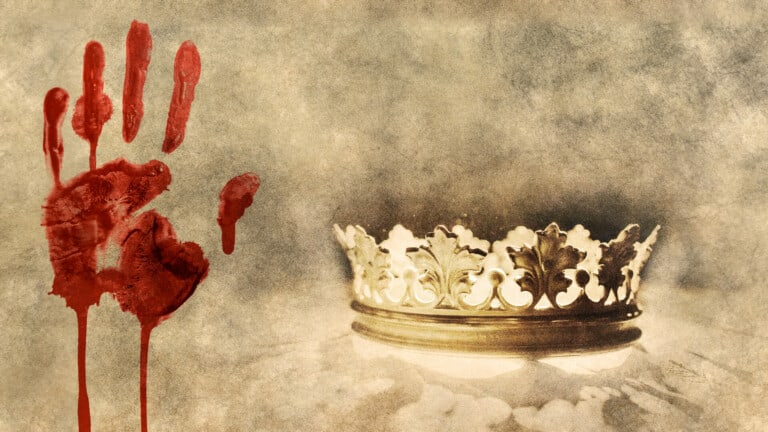Political questions are typical of the Renaissance: it is due to the inheritance of rulers by divine right.
Malcolm, the oldest of Duncan”s sons, is declared heir to the throne and Prince of Cumberland. Like Richard III, Macbeth wants to disrupt the natural order of things.
At the end of Macbeth, just like in Richard III, the natural order is restored (“Hail, King of Scotland”) and the divine right is respected.
The feudal social organization is based on duty, loyalty, and allegiance to the King. All these virtues are violated by Macbeth.
Like disorder, treason is unnatural. A traitor is an unnatural subject. In II, 2 Macduff discovers the dead King and describes the deed as the “most sacrilegious murder” and the murderer as “a new Gorgon“. Killing a rightful monarch is an offense to order.
In II, 4, 5 we see that what happens on earth is closely linked to what happens in the “skies”. The events on earth (“sublunary”) are so horrible that an eclipse occurs, meaning that the sun dares not happen. The murder of a King is unnatural, horrible, and impossible to name.
The whole play is based on the contrast between true royalty and tyranny. Duncan is the good King and Macbeth is the Tyrant. The subjects love the good King but fear the tyrant like in V, 2, 19: “Nothing in love” .
In V, 3, Macbeth boasts himself to have a spy in each of his subjects” house. The tyrant used to have spies. Macbeth is unfair (like Richard III) and Justice is the main quality of a good ruler. The abuse of power is shown in Act V, sc3, v11.
Macbeth is gradually more and more lonely and less and less communicative. He fears himself, perhaps because if he has killed the King, he can be killed too.
What is a good ruler ?
This question is set everywhere in Shakespeare”s works (see The Tempest). A good ruler has to be the natural heir of the throne and needs culture, knowledge, and prudentia.
In Act IV, sc3, Malcolm is precocious and aware that “a good man can turn evil / A bad man can turn good”.
Malcolm is not as naive as his father. He will test Macduff, whom he thinks is one of Macbeth”s spies, by pretending to be totally awful. Malcolm recounts Cawdor”s death in I, 4. He is aware of Man”s nature and tells how Cawdor, a bad man, turned repentant.
Macbeth is compared to Satan because he is so valorous and close to the king that he thinks he can take his place. The central moral debate is how could Satan, so close to perfection, rebel against God.
The answer is plain: because of jealousy. Macbeth was Duncan”s favourite knight just like Satan was God”s favourite angel.
Malcolm has prudentia and has learnt to be aware of traitors. Macbeth is tempted and falls. Malcolm is even aware that fall is part of Human Nature.
It was the post-lapsarian period: everybody can fall and no one is innocent. The link between Macbeth and Satan resides in the name of Macbeth”s servant, Seyton.

